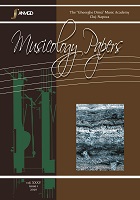The Influence of Luther's View of Music on the Emergence of the Concepts of Musica Poetica and Musical Rhetoric
The Influence of Luther's View of Music on the Emergence of the Concepts of Musica Poetica and Musical Rhetoric
Author(s): Anamaria LupuSubject(s): Christian Theology and Religion, Music, Sociology of Art
Published by: MediaMusica
Keywords: Martin Luther; Lutheran Reformation; musical rhetoric; musica poetica; theory of the affects; rhetorical figures;
Summary/Abstract: When we speak about musical rhetoric, rhetorical figures, or elements related to musica poetica, we almost always automatically think about the Baroque and, why not, about Johann Sebastian Bach’s music. However, few of us realize that the roots of these notions trace back to the Renaissance, and even fewer will relate them to Martin Luther’s name and the Protestant Reformation. The principles of musical rhetoric developed mainly in the North German space, although they were also present in other countries such as Italy, France and England. It was Germany, however, that in those times most enthusiastically adopted and adapted the terminology, methods and structures of ancient rhetoric. In his Musica Poetica, the German musicologist Dietrich Bartel explains the rise of musical rhetoric in Germany as a consequence of Martin Luther’s view of music being embraced by the Christian believers. Over the sixteenth to eighteenth centuries, musical rhetoric was continuously enriched and perfected, generating an extremely elaborate art whose focus was to find equivalences between rhetorical figures and musical intervals. Thus, music acquired a higher degree of accuracy of expression.
Journal: Lucrări de Muzicologie
- Issue Year: 34/2020
- Issue No: 1
- Page Range: 35-40
- Page Count: 6
- Language: English
- Content File-PDF

